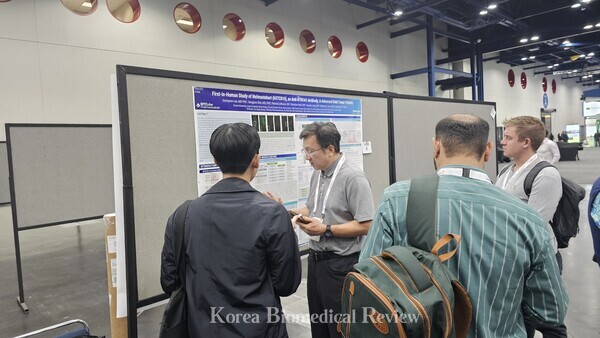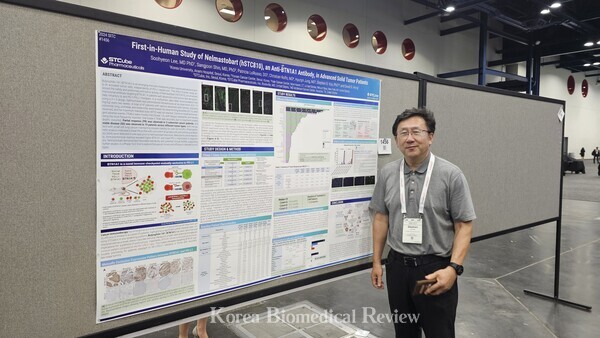HOUSTON, TX -- By Lee Han-soo/Korea Biomedical Review correspondent – STCube, a Korean immunotherapy developer, has announced positive results from its phase 1 clinical trial of nelmastobart, demonstrating both safety and efficacy in treating cold tumors that are typically unresponsive to existing immunotherapies.
The company stressed that this findings, presented at this year's Society for Immunotherapy of Cancer (SITC) conference in Houston, suggest that BTN1A1 could serve as a powerful new biomarker for immunotherapy.
The company's approach to targeting BTN1A1 emerged from its research into immune checkpoints that function under extreme stress conditions.

"We were interested in finding immune checkpoints that work under more stressful conditions than normal tumor environments," STCube CSO Yoo Sung-han told Korea Biomedical Review. "We discovered BTN1A1 when studying tumor responses to radiation, which creates extremely stressful conditions for cancer cells."
The phase 1 trial enrolled 47 patients across the U.S. and Korea, evaluating nelmastobart as a monotherapy in patients with advanced solid tumors. The study showed treatment-related adverse events in 51.1 percent of patients, mostly mild in nature, with only one case reaching Grade 3 severity and no treatment-related deaths reported.
Professor Lee Su-hyeon from Korea University Anam Hospital, the study's principal investigator, highlighted the drug's remarkable impact on colorectal cancer patients.
"These patients had no other treatment options and were expected to live only about four months. Many maintained stable disease for six to eight months, and some even responded for up to a year," Lee said. "What's particularly striking is that they maintained their quality of life throughout treatment.”
Unlike trials with other well-known immunotherapies where patients often deteriorate within two to three cycles or suffer from severe side effects, these patients remained remarkably stable, she added.
The drug's safety profile particularly stands out.

"Our antibody is extremely safe, which is crucial for cancer therapeutics,” he said. “This safety profile means we can administer high doses as a monotherapy and, more importantly, combine it with other treatments.”
Yoo stressed that most cancer therapies require combination approaches – whether with chemotherapy, radiation, TKIs, or other immune checkpoint inhibitors – and toxicity often increases when drugs are combined.
According to Yoo, what makes BTN1A1 particularly interesting is its mutually exclusive expression pattern with PD-L1.
"When we first discovered BTN1A1, we found that it's expressed in tumors where PD-L1 isn't present,” he said. “This suggested to us that BTN1A1 and PD-L1 are immune checkpoints operating in different contexts.”
The biomarker aspects of BTN1A1 are especially promising, as it shows consistently high expression levels when present.
"Unlike PD-L1, which often shows weak expression and is difficult to use as a biomarker, BTN1A1 shows strong expression in cancer cells when it appears,” he said. “This makes it much more reliable as a biomarker.”
The company found that when examining 10 patients, it typically found significant BTN1A1 expression in three or four of them.
“When it's expressed, it's very strong – we're talking 30-40-50-60 percent expression levels, compared to PD-L1's typical 20 percent,” the CSO said.
Professor Lee's ongoing investigator-initiated trial has provided additional insights.
"Out of 14 patients we've tested so far, four showed very high BTN1A1 expression, and all four achieved partial responses. While one patient progressed after the initial response, three are maintaining their partial responses," Lee shared. "The biomarker testing is relatively simple and results come back within for to five days, unlike NGS testing which can take a month and is much more expensive."
STCube is currently focusing on colorectal cancer and small cell lung cancer for its phase 1b/2 trials, a decision driven by both clinical and market considerations.
The company also plans to present additional clinical data at major oncology conferences next year, including ASCO and ESMO, as their ongoing trials mature. The company has also begun receiving interest from pharmaceutical companies following their poster presentation at SITC.
Related articles
- Korean biotech companies to present latest cancer immunotherapies at SITC 2024
- [SITC 2024] Abion presents data on antibody-interferon platform for cancer treatment
- [SITC 2024] LigaChem Biosciences presents STING agonist preclinical data
- [SITC 2024] MD Anderson study shows Lunit SCOPE IO platform could transform immunotherapy selection
- [SITC 2024] GI Innovation’s therapies aim to enhance CAR-T durability and overcome tumor immune suppression
- STCube clears ‘management risk’ status with financial turnaround to fast-track drug development
- [Interview] Novel immunotherapy nelmastobart shows promise in MSS colorectal cancer: early trial data
- STCube receives IND approval for nelmastobart in metastatic colorectal cancer in Korea

